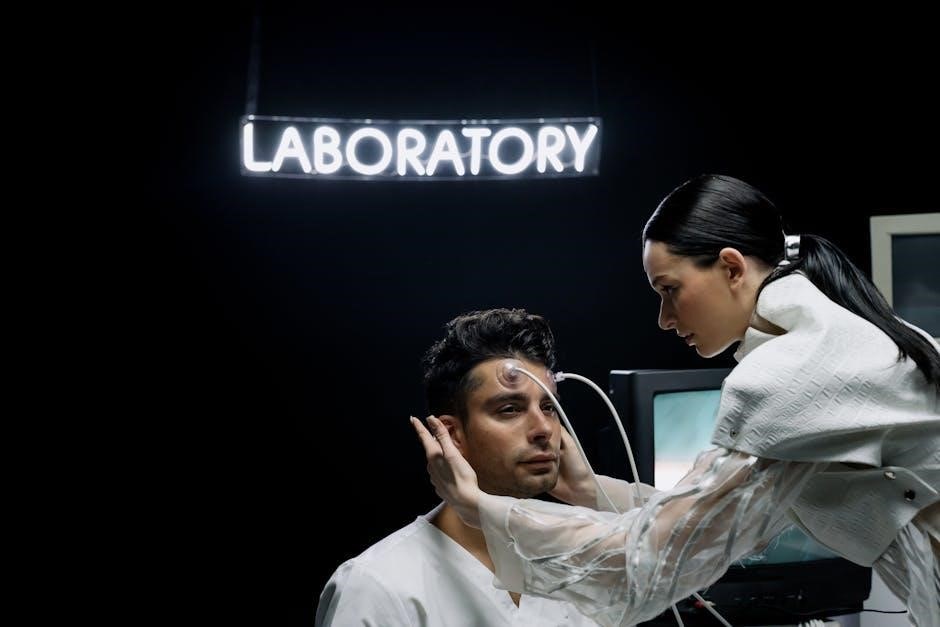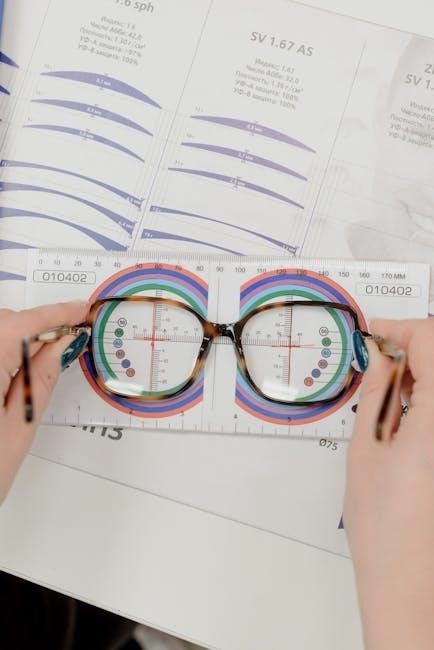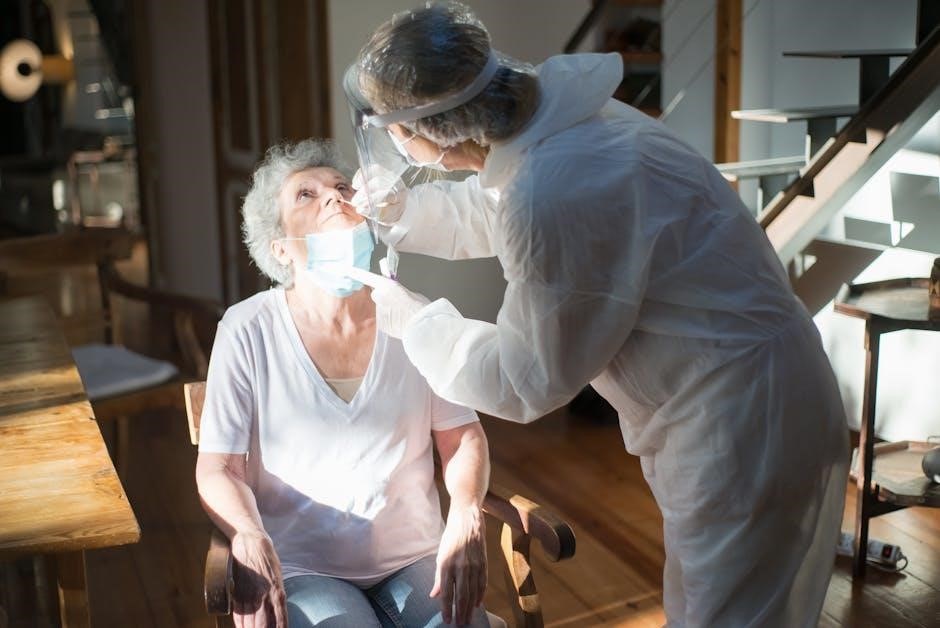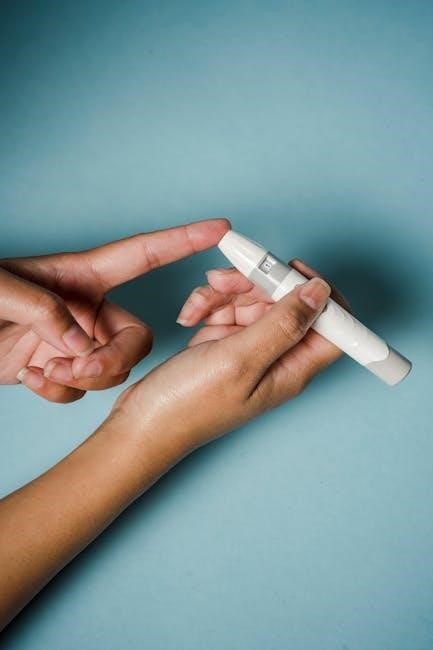Overview of Remote Testing with ProctorU
Remote testing with ProctorU is available for TABE 11 & 12 only․ Test administration and reporting are the same as other TABE Online tests․ The process assumes familiarity with TABE and the DRC INSIGHT Portal․
TABE Online Testing offers a flexible and secure way to assess adult learners’ skills in reading, writing, and computation․ It aligns with in-person testing but provides the convenience of remote administration․ ProctorU enables live monitoring to ensure test integrity, while the DRC INSIGHT Portal streamlines test administration and reporting․ Test examiners must complete a device readiness check and verify system compatibility before testing․ This ensures a smooth experience for both examiners and test takers․ Familiarity with TABE Online and supported platforms is essential for effective remote test administration․
Key Features of Remote Proctoring
Remote proctoring through ProctorU offers real-time monitoring, ensuring test integrity and security․ It supports multiple web conferencing platforms like Zoom, Webex, and Google Meet, providing flexibility; Automated system checks verify device readiness, while live proctors monitor test takers to prevent cheating․ The platform allows for seamless communication and issue resolution during testing․ These features ensure a secure, fair, and efficient testing environment, maintaining the high standards of TABE assessments while accommodating the needs of remote learners and examiners․

Examiner Qualifications and Requirements
Examiners must be trained and familiar with TABE Online and use supported web conferencing platforms like Zoom, Webex, or Google Meet․ Proficiency in these tools is essential․
Training and Familiarity with TABE Online

Examiners must complete training to ensure proficiency with TABE Online and the DRC INSIGHT Portal․ Familiarity with the platform is crucial for smooth test administration․ Training covers system navigation, test setup, and monitoring tools․ Hands-on practice ensures examiners understand all features and functions․ Proper training enables examiners to address technical issues promptly and maintain test integrity․ It also ensures compliance with security protocols and testing standards․ Regular updates and refresher courses are recommended to stay informed about platform changes․ This ensures a seamless and secure testing experience for all participants․
Supported Web Conferencing Platforms
Examiners must use supported web conferencing platforms like Zoom, Webex, or Google Meet for remote testing․ These tools ensure real-time monitoring and communication with test takers․ Platforms must be tested beforehand to ensure compatibility and functionality․ Familiarity with the chosen platform is essential for smooth test administration․ Additional tools or extensions may be required to facilitate proctoring functions․ Ensure all software updates are installed to avoid technical issues․ Proper use of these platforms helps maintain test security and integrity, ensuring a fair and reliable testing experience for all participants․
System and Device Requirements
A computer (desktop or laptop) or Chromebook is required․ Devices must be plugged in during testing․ Cell phones, iPads, and some tablets are not supported․
Recommended Devices for Testing
For remote testing, a computer (desktop or laptop) or Chromebook is recommended․ Ensure the device is plugged in during testing․ Cell phones, iPads, and most tablets are not supported due to compatibility issues․ ProctorU specifies that devices must meet minimum system requirements for smooth test administration․ A stable internet connection is essential to prevent disruptions․ Avoid using public Wi-Fi or shared networks․ The device should have a webcam and microphone for proctoring․ Screen size should be adequate for readability․ Test takers must ensure devices are fully charged or plugged in to avoid interruptions during the test session․
Device Readiness Check
A device readiness check is essential before remote testing․ Ensure the webcam and microphone are functional, as they are required for proctoring․ Use a supported browser and disable pop-ups․ A stable internet connection is critical to avoid interruptions․ Test takers should close unnecessary applications and restart their device before the test․ Verify that the device meets ProctorU’s system requirements, including screen resolution and operating system compatibility․ Conducting this check ensures a smooth testing experience and prevents technical issues during the session․ Familiarize yourself with the device’s settings to resolve any connectivity problems promptly․

Registration and Scheduling
Examiners must create an account on the DRC INSIGHT Portal․ Schedule tests by selecting a date and time, ensuring availability․ Use supported platforms like Zoom or Webex․
Creating an Account on the DRC INSIGHT Portal
To begin, examiners must create an account on the DRC INSIGHT Portal․ Visit the portal, click “Create Account,” and provide required information․ Verify your email address and set up a secure password․ Familiarize yourself with the portal’s interface, as it will be used for test scheduling and management․ Ensure all personal and professional details are accurate․ If assistance is needed, refer to user guides or contact support․ This step is crucial for accessing TABE Online tests and managing remote proctoring sessions effectively․ Proper account setup ensures smooth test administration and reporting processes․
Scheduling a Remote Test
Once logged into the DRC INSIGHT Portal, navigate to the “Test Administration” section․ Select the test type (TABE 11 or 12) and choose a date and time for the remote test․ Enter the test taker’s information and confirm the details․ Ensure the system and device meet all requirements before finalizing․ A confirmation email will be sent with instructions and a link for the test session․ Verify the test taker’s identity upon login and ensure a stable internet connection․ Familiarize yourself with the web conferencing platform to monitor the test effectively․ Proper scheduling ensures a smooth remote testing experience․

Pre-Test Procedures
Pre-test procedures involve logging into the DRC INSIGHT Portal, accessing the test dashboard, reviewing the test schedule, and ensuring all necessary materials and documentation for smooth test administration․
Conducting a System Check
Conducting a system check ensures all technical requirements are met․ Verify internet connection, browser compatibility, and audio/video settings․ Ensure devices like Chromebooks are supported․ Avoid iPads or tablets․ Test screen sharing and webcam functionality․ Confirm ProctorU compatibility․ Check for updates․ Ensure no background applications interfere․ Test microphones and speakers․ Verify document sharing․ Ensure stable network connection․ Familiarize with troubleshooting steps․ Follow ProctorU guidelines․ Regular checks prevent technical issues during testing․ Ensure system readiness before test start․ Address any issues promptly to ensure smooth test administration․ Regular system checks are essential for a seamless remote testing experience․
Verifying Test Taker Identity
Verifying the test taker’s identity is critical for security․ Ensure the individual matches the registered candidate by checking a government-issued ID․ Conduct a live video check to confirm presence․ Use secure platforms like Zoom, Webex, or Google Meet for real-time verification․ Ensure the test taker is alone in the room․ Verify no unauthorized materials are present․ Monitor for any suspicious behavior․ Ensure the test taker’s face and ID are clearly visible․ Confirm the test taker’s name matches the registration details․ Document the verification process․ Ensure compliance with proctoring guidelines․ Identity verification ensures test integrity and prevents impersonation․ Maintain strict protocols throughout the process․

During the Test
Monitor test takers in real-time via webcam and screen sharing․ Provide technical support if issues arise․ Ensure a secure, distraction-free environment throughout the test session․
Monitoring the Test Taker
Examiners must actively monitor test takers using live webcam and screen-sharing tools․ Ensure test takers remain visible and maintain a clear view of their workspace․ ProctorU or other supported platforms facilitate real-time observation․ If any suspicious activity occurs, intervene promptly to address potential violations of test policies․ Use chat or audio features to communicate instructions or clarifications․ Maintain a secure testing environment by monitoring for unauthorized resources or distractions․ Document any incidents and escalate if necessary to ensure test integrity․ Continuous vigilance is crucial to uphold the validity and security of the remote testing process․ Technical support should be available to address connectivity issues promptly․
Handling Technical Issues
Examiners must be prepared to address technical issues promptly to ensure uninterrupted testing․ Begin by guiding test takers to check their internet connection or restart devices․ If issues persist, troubleshoot using platform tools or escalate to technical support․ Maintain open communication with test takers to minimize anxiety․ Document all technical problems and resolutions for post-test review․ Ensure testing resumes smoothly, adhering to security protocols․ ProctorU and other supported platforms often provide live support to assist with connectivity or software issues, enabling quick resolution and maintaining test integrity․ Stay calm and methodical when addressing technical challenges to uphold the testing process․

Post-Test Procedures
After the test concludes, submit results through the DRC INSIGHT Portal․ Review test reports to ensure accuracy and completeness, addressing any discrepancies promptly․
Submitting Test Results
After the test is completed, results are submitted securely through the DRC INSIGHT Portal․ Ensure all test data is accurately uploaded and confirmed․ The system automatically stores results, maintaining confidentiality and integrity․ Verify submission confirmation to finalize the process․ Results are accessible to authorized personnel for further review and analysis․ This step ensures seamless communication between the testing platform and administrative systems, adhering to security protocols and testing standards․

Reviewing Test Reports
After submitting test results, examiners can review detailed test reports through the DRC INSIGHT Portal․ Reports provide comprehensive insights into test takers’ performance, including scores, percentile rankings, and skill-level assessments․ This data helps identify strengths and areas for improvement․ Reports are securely stored and easily accessible for authorized personnel․ Reviewing these documents ensures accurate assessment of test takers’ knowledge and skills, supporting informed decision-making for education and career planning․ The system maintains the integrity and confidentiality of test results, adhering to established testing standards and protocols․

Security and Integrity
ProctorU ensures secure test environments through live monitoring and identity verification, maintaining test integrity․ Stringent protocols prevent cheating and data breaches, ensuring valid outcomes․
Encryption and secure transmission of results guarantee confidentiality․ Rigorous authentication processes further safeguard the testing process, upholding the highest standards of security and fairness․
Ensuring Test Security
ProctorU employs multiple layers of security to ensure test integrity․ Live monitoring by certified proctors, real-time identity verification, and secure browser lockdowns prevent unauthorized access․ Test environments are continuously scanned for potential breaches or unauthorized materials․
All test sessions are encrypted, and results are securely transmitted to the DRC INSIGHT Portal․ Proctors are trained to identify and address security risks promptly, ensuring a fair and valid testing experience for all participants․
Preventing Cheating
ProctorU utilizes identity verification, live monitoring, and secure browser lockdowns to prevent cheating․ Test takers are required to present valid ID and undergo environmental scans․ Proctors actively monitor for unusual behavior, such as unauthorized materials or multiple screens․ The platform also employs AI-driven alerts to detect potential violations․ Additionally, a secure browser environment restricts access to external tools or websites during testing․ These measures ensure the integrity of the test and maintain fairness for all participants․ Proctors are trained to address any suspicious activity promptly and escalate issues if necessary․
Remote testing with ProctorU offers a flexible and secure solution for administering TABE exams․ By leveraging advanced proctoring tools and maintaining rigorous security protocols, it ensures the integrity of the testing process․ Test takers benefit from the convenience of taking exams remotely while examiners can confidently monitor and manage test sessions․ The integration with the DRC INSIGHT Portal streamlines test administration and reporting․ With proper training and adherence to guidelines, remote testing provides an efficient and reliable option for assessing adult education outcomes․ This approach supports the mission of enabling adult learners to achieve their educational and career goals effectively․
